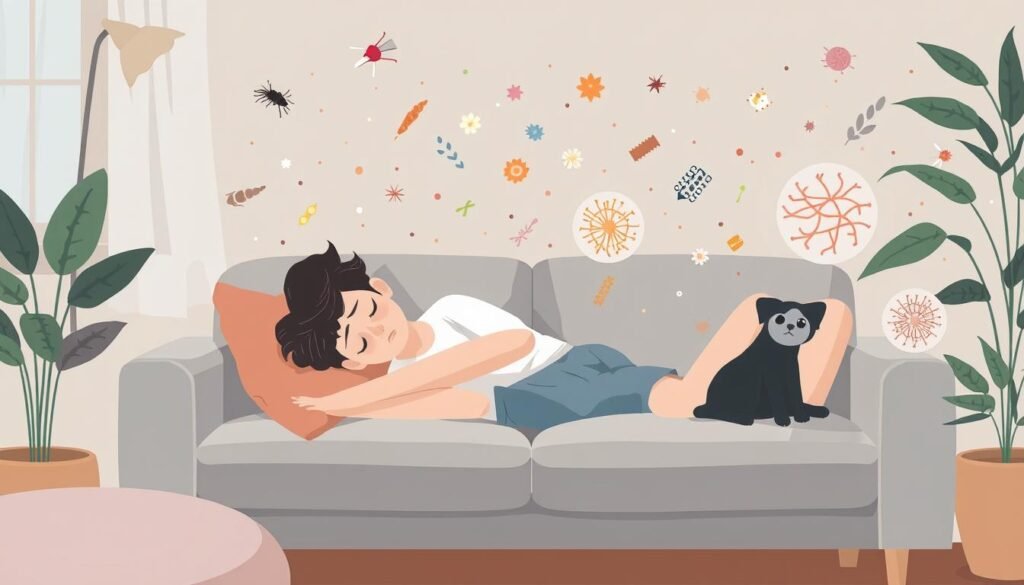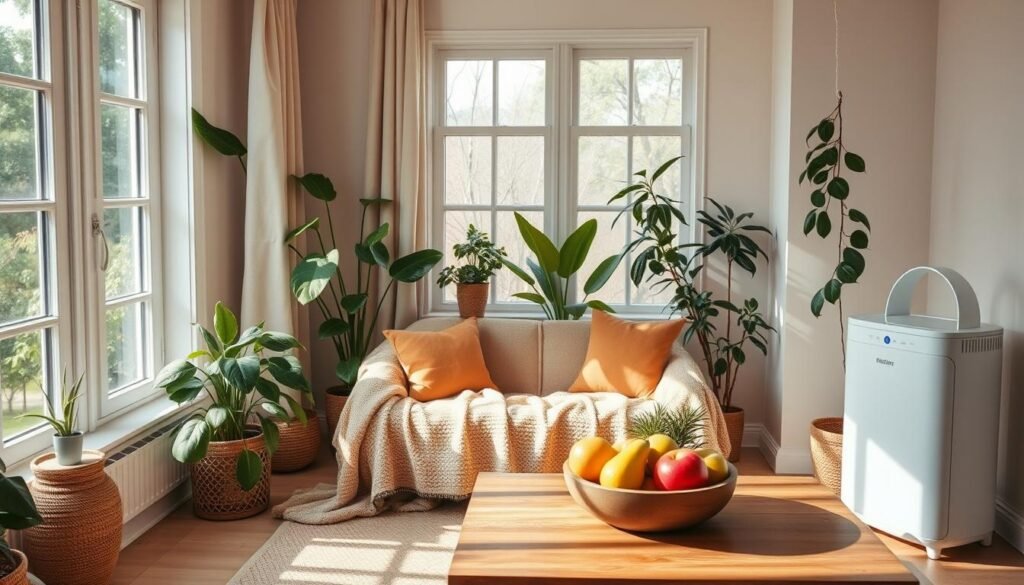About 50 million Americans have allergies each year. Nearly 30% of them feel really tired because of their allergies. This tiredness makes it hard to do day-to-day things, making people feel worn out. As allergy season comes, knowing what causes your allergies and how to handle them is key. This helps you get your energy back and feel better overall.
By using smart ways to handle symptoms and understanding how allergies affect you, you can fight off tiredness. Things like drinking more water and changing what you eat can really help. With the right info and tools, you can feel strong and lively again, even when allergies try to bring you down. Learn more here about these strategies.
Key Takeaways
- Allergy fatigue impacts nearly 30% of people with seasonal allergies.
- Finding out exactly what you’re allergic to is key to handling symptoms well.
- Drinking more water can help cut down on how much histamine your body makes, which can lessen tiredness.
- Eating foods high in Vitamin C and exercising often can boost your energy.
- Talking with doctors can help you find specialized ways to manage your allergy symptoms.
Understanding Allergy Fatigue
Allergy fatigue is more than just feeling tired. It’s a deep exhaustion that messes with your daily activities. It usually starts when your immune system fights off allergens. This battle releases histamines and other chemicals, draining your energy and messing with your sleep.
People with allergy fatigue deal with:
- Constant tiredness
- Mental fog
- Irritability
- Reduced motivation
- Sleep disturbances
- Increased stress and anxiety
About 60% of folks with allergies say they feel really tired because of it. This tiredness can make it hard to work or enjoy life. If you have year-round allergies, like to dust or mold, you might feel even more worn out. Studies suggest that most allergy sufferers feel these effects all year long.
Many people with allergies don’t sleep well, which leaves them feeling wiped out. About half of them say they have trouble sleeping. Knowing more about allergy fatigue helps you take steps to deal with it.
The Immune Response and Its Role in Exhaustion
The immune system fights against allergens like pollen and pet dander. This fight can make you feel very tired. When these allergens get into our bodies, our immune system reacts. It makes antibodies, specifically immunoglobulin E, to attack these substances. Then, our bodies release histamines which can cause inflammation and stuffy noses.
Dealing with allergens uses a lot of energy, much like when you’re sick. Histamines can also mess up our sleep, making us feel even more tired. About 30% of people with hay fever say they feel too tired to do their usual activities.
If we’re always around allergens, our immune system is always on alert. This constant alertness can make us feel very tired all the time. Studies show that half the people with allergies feel really tired. It shows that managing allergies is key to feeling more energetic.
| Aspect | Impact of Immune Response |
|---|---|
| Allergens | Pollen, bee venom, pet dander, foods, and medicines trigger the immune response. |
| Histamine Release | Causes inflammation and contributes to sleep disturbances and fatigue. |
| Antibody Production | Immunoglobulin E targets allergens, activating the immune system. |
| Fatigue Prevalence | About 50% of allergy sufferers experience significant fatigue. |
| Sleep Disruption | Average reduction of 1-2 hours of sleep per night can occur, affecting energy levels. |
Common Symptoms of Allergy Fatigue
Allergy fatigue impacts millions around the world. Many report feeling constantly tired and facing brain fog. This fuzziness makes focusing hard and slows down day-to-day tasks. Recognizing symptoms is key for those with allergies. It helps greatly in managing health. Around 50% of allergy sufferers say fatigue messes with their daily lives.
Nasal congestion is another symptom that comes from allergy fatigue. It can make breathing hard and mess up sleep. Studies show around 40% of people with allergies have sleep problems. This makes their fatigue worse. Long-term allergen exposure ruins sleep quality, leading to ongoing tiredness.
About 60-70% of those with allergic rhinitis or sinusitis feel brain fog. It clouds thinking, affecting work and social life. Furthermore, antihistamines for allergies can cause drowsiness. Nearly half of those taking such meds may feel tired because of them.
Understanding these symptoms helps see how allergies lead to tiredness. It’s important to manage symptoms for better daily life. Avoiding allergens and talking to doctors can help. For more tips, check out this guide.
| Symptom | Impact on Daily Life | Prevalence |
|---|---|---|
| Persistent Fatigue | Reduces energy and productivity | Affects up to 50% of allergy sufferers |
| Brain Fog | Impaired concentration and focus | Experienced by 60-70% of individuals with allergic rhinitis |
| Nasal Congestion | Leads to sleep disturbances | Reported by 40% of allergic individuals |
Allergy Fatigue: Causes and Triggers
Allergy fatigue comes from common allergens like pollen, dust mites, and pet dander. Seasonal allergies peak at different times. For example, spring means tree pollen, and fall brings ragweed. Knowing these patterns helps us understand allergy-induced fatigue.
Indoor allergens, such as dust mites, affect 10-30% of people all year. This can disrupt daily life. Half of those with asthma also have allergic rhinitis. This doubles their fatigue, dropping productivity by 30-40%.
Allergy symptoms can severely impact well-being. Hay fever, for example, affects 30% of people with poor sleep quality. Studies show allergy sufferers might get 30% less effective sleep. With 69% of adults with allergies feeling majorly tired, the connection to allergens is clear.
To manage allergy fatigue, know your triggers. Avoiding common allergens can lessen both allergic reactions and the resulting tiredness. For more tips on dealing with allergy fatigue, check out this resource.

| Allergen | Peak Seasons | Common Symptoms | Impact on Fatigue |
|---|---|---|---|
| Pollen | Spring (trees), Summer (grass), Fall (ragweed) | Sneezing, congestion, watery eyes | High, due to sleep disruption |
| Dust Mites | Year-round | Coughing, itchy eyes, nasal congestion | Moderate, contributes to chronic fatigue |
| Pet Dander | Year-round | Sneezing, runny nose, skin irritation | Moderate, affects quality of life |
| Mold Spores | Humidity-based, common indoors | Coughing, wheezing, fatigue | High, especially with severe reactions |
Identifying Your Allergens
Knowing what causes your allergic reactions is key. Allergy tests are important to find out these triggers. By figuring out these factors, you can stay away from them. This helps lessen the tiredness allergies can cause.
Types of Allergy Tests
There are a few ways to test for allergies. The main methods are skin prick tests and blood tests. Both have their own benefits:
| Test Type | Description | Results |
|---|---|---|
| Skin Prick Test | Small amounts of allergens are applied to the skin. | Immediate feedback on allergic responses. |
| Blood Test | Measures specific antibodies (IgE) in the blood. | Shows reaction levels to potential allergens. |
Importance of Knowing Your Triggers
Figuring out what you’re allergic to helps you control your surroundings. Knowing your triggers helps reduce contact with them. It also helps choose the right meds and treatments. For many, knowing their allergies boosts their daily energy and overall health.
Combatting Allergy Fatigue with Effective Strategies
Fighting allergy fatigue needs multiple approaches. Using strategies for fatigue greatly improves life for those with allergies. Focus on better sleep hygiene and get healthcare consultation for advice suited to you.
Sleep Hygiene Improvements
Making sleep hygiene better is key for beating allergy fatigue. An allergy-safe bedroom helps you sleep better. Here are some tips:
- Use hypoallergenic bedding to keep dust mites and allergens away.
- Put air purifiers in your bedroom to clean the air.
- Try nasal sprays at night to clear your nose for better breathing.
With these steps, you can fight off sleeplessness due to allergies. This leads to deeper, more refreshing sleep.
Consulting Healthcare Professionals
Seeing a healthcare professional gives you advice tailored to your allergies. Allergists can offer:
- Skin prick or blood tests to find out what triggers your allergies.
- Long-term treatments like oral immunotherapy or allergy shots.
These methods can cut down on your exposure to allergens. This makes a big difference in fatigue and how well you sleep. For more tips on dealing with allergy fatigue, check this useful resource.
Over-the-Counter and Prescription Medications
When trying to manage allergy fatigue, choosing the right medication is key. Over-the-counter drugs are easy to get and mostly include antihistamines. First-generation antihistamines, like diphenhydramine (Benadryl®), offer fast relief but can make you sleepy, worsening fatigue.
On the other hand, second-generation antihistamines such as cetirizine (Zyrtec®), fexofenadine (Allegra®), and loratadine (Claritin®) aim to ease fatigue without making you drowsy. Picking the right antihistamine matters a lot. Second-generation ones are designed to be “nonsedating” and usually don’t make you as tired as first-generation drugs. Allegra, in particular, is known for being the least likely to sedate.
For targeted action, prescribed nasal spray antihistamines can tackle nasal symptoms well. These sprays work right where the problem is, helping to cut down on sleepiness.
Over-the-counter intranasal corticosteroids are another option against antihistamines. They’re good because they can ease symptoms without needing pills right away. They might need a few days to work, but using them regularly helps control allergies. This reduces the dependency on antihistamines.
Every medication has its advantages and specific uses. Corticosteroids, for instance, work against inflammation. This makes them good for dealing with constant or seasonal allergies. But, it’s important to think about the good and bad sides of each option. For example, oral corticosteroids can lead to issues like high blood sugar and stomach ulcers if used too much.
For people whose symptoms last more than two weeks or don’t get better with over-the-counter drugs, seeing a doctor is recommended. They might suggest immunotherapy or prescription drugs that fit the person’s needs better.
Lifestyle Changes to Manage Allergy Fatigue
Changing your lifestyle is key to fighting allergy fatigue. Focus on your diet, exercise, and handling stress. These steps lead to more energy and less discomfort, making you feel better overall.
Diet and Nutrition for Better Energy Levels
Eating well is crucial. Load up on fruits and veggies. Foods like berries, greens, and nuts fight inflammation. Studies show that eating right boosts your immunity by 30%. This lessens allergy fatigue and increases life quality. Learn more about these changes.
Regular Exercise and Its Benefits
Active living boosts your immune system and energy. Try to get 150 minutes of exercise each week. It’s key for tackling allergy fatigue. Exercise strengthens your body against allergens and enhances your sleep, often disturbed by allergies.
Stress Management Techniques
Reducing stress through meditation and mindfulness is crucial. Stress worsens allergy symptoms, making you more tired. These practices offer relief and foster emotional health. They make your body fight allergens better.

Impact of Hydration on Allergy Fatigue
It’s key to stay hydrated to manage allergy fatigue. Drinking enough water helps your body function well. This includes making mucus less thick, which makes breathing easier for allergy sufferers. Try to drink at least eight glasses of water a day. This will make you feel better, especially when allergies hit.
Not drinking enough water can trigger more histamine in your body. This can make allergy symptoms worse. Dehydration is a bigger problem when it’s very pollen-y or humid out. Allergy fatigue impacts about 25 million adults in the U.S. So, drinking lots of fluids is crucial to ease these symptoms.
Staying hydrated helps lessen mucus, which in turn eases nasal congestion. Drinking structured water is even better for staying hydrated. Also, try to cut back on caffeine and alcohol. They can dehydrate you and make your allergies act up more.
To wrap up, staying hydrated is super important. Drinking enough water helps lessen allergy discomfort and boosts your energy. Taking care of your hydration needs also helps fight allergy fatigue. It improves life quality for those with allergies.
Long-Term Strategies for Managing Symptoms
To manage allergies well, you need to be proactive. Personal strategies can make life much better. By testing for allergies regularly, you learn what to avoid.
Creating plans based on these tests helps avoid allergy triggers. This is key to controlling symptoms. Knowing what makes your allergies worse lets you stay one step ahead.
A healthy lifestyle helps control allergies. Eat foods that fight inflammation. Exercise often and manage stress. This improves your overall health.
Also, keep an eye on pollen counts. Knowing when to stay inside helps you avoid allergy flare-ups. It’s a simple way to feel better during allergy season.
It’s important to see your doctor regularly. They can change your treatment if needed. This ensures your allergies are managed well.
For some, allergy shots or under-the-tongue treatments are helpful. They might reduce the need for medications over time.
Keep a diary of your allergy symptoms. It helps spot patterns and triggers. Share this info with your doctor to fine-tune your treatment plan.
By following these steps, you can lead a healthier life. And you can keep your allergy symptoms in check.
| Strategy | Description |
|---|---|
| Routine Allergy Testing | Helps reassess triggers and informs action plans for symptom control. |
| Personalized Action Plan | Tailored strategies for individuals based on specific allergens. |
| Regular Consultations | Necessary to evaluate and adjust treatment plans and medications. |
| Symptom Diary | Tracks symptoms, aiding in identifying patterns and triggers. |
| Monitoring Pollen Counts | Helps schedule outdoor activities to avoid peak allergen times. |

When to Seek Professional Help
Every year, over 100 million people in the U.S. face different allergies. Many find that constant allergy fatigue disrupts their daily activities. If fatigue gets worse or greatly affects your work or life, it’s important to think about getting professional help.
It’s key to know that lasting symptoms, like chronic sinus infections over eight weeks, could point to allergies. These persistent allergy symptoms can lower your quality of life. Seeing a doctor who knows about allergies for a detailed check-up is often suggested.
A health expert can do thorough exams to check if other health issues cause your tiredness. They might do skin tests or blood tests for IgE levels, showing how severe your allergies are. Getting the right health advice can lead to treatments specifically for you.
Seeing an allergist can improve how you manage tough allergy symptoms. Options like immunotherapy, which makes the immune system less sensitive to allergens over time, might help in the long run. Working closely with professionals means you get the latest advice and treatments that fit your life.
Conclusion
Beating allergy fatigue boosts your quality of life and every day work. People with allergies often deal with broken sleep and constant tiredness. Studies prove that allergies cause bad sleep, cutting productivity by up to 20%.
By knowing how our bodies react and pinpointing allergens, we can manage symptoms better. Allergy tests help 70-90% of patients feel better, while treatments like immunotherapy are effective for 60-80% of those treated. It’s key for those impacted to make lifestyle changes, like keeping their spaces clean and getting expert advice, which are crucial in fighting fatigue.
Acting early to understand and handle allergy symptoms can greatly lessen tiredness. With the right knowledge and strategies, people can boost their energy and better their lives. This makes dealing with allergy seasons a lot easier.